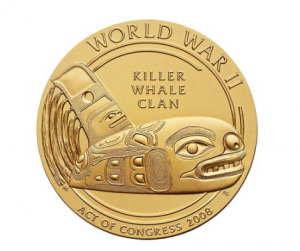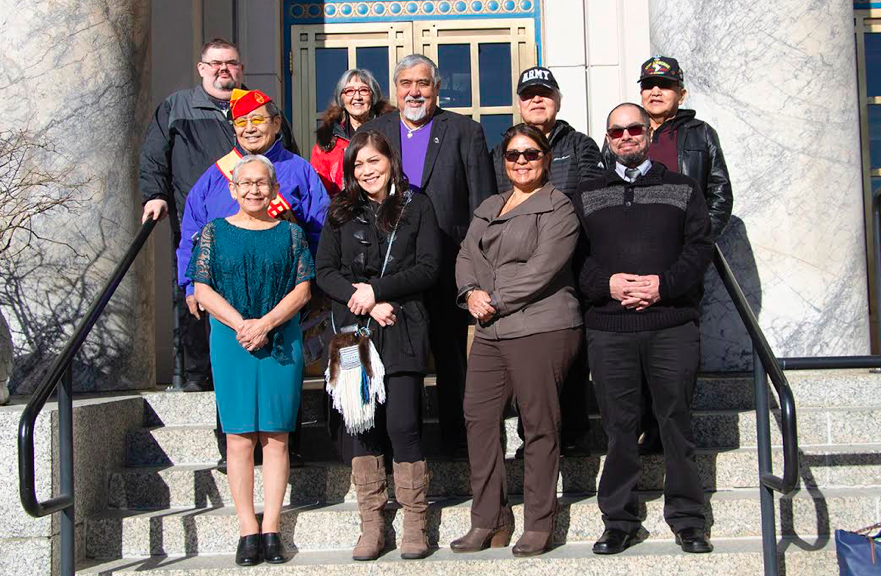The Alaska State Legislature on Wednesday honored Alaska’s Tlingit code talkers for their exemplary military service and the crucial role they played in helping to end World War II.
Although the Tlingit code talkers have been recognized by Congress, this is the first official State recognition for their secret service in defeating Imperial Japanese Army and bringing the war to a close.
The citation passed by the House and Senate posthumously honored Tlingit code talkers Robert Jeff David, Sr., Richard Bean, Sr., George Lewis, Jr., and brothers Harvey Jacobs and Mark Jacobs, Jr.
Several family members of the late code talkers watched from the House and Senate galleries.
“Their story is a testament to the ingenuity, nobility and bravery of Alaska Native people and highlights the importance of preserving the Tlingit language,” said Senate Majority Leader Mia Costello.
The term “code talker” is usually associated with the better known Navajos, but Comanches, Hopis, Meskwakis, and Tlingits — far away in Territorial Alaska — also were recruited into the program. Code talking for military uses goes back at least as far as World War I with Cherokee and Choctaw peoples.
The Tlingit families never knew about their men’s specialized service to the country, according to former House Rep. Bill Thomas, who initiated the effort for the citation. At the time, of course, Alaska was not only a territory of the United States, but was also a war zone when the Japanese invaded Attu and Kiska Islands in the Aleutians.
“I knew Jeff (David) all my life and he took it right to the grave,” said Thomas, who is a Tlingit elder and U.S. Army veteran (Vietnam, 1968). Thomas said though David often spoke proudly of his accomplishments as a hall-of-fame basketball player and fishing highliner, his amazing achievements as a code talker were never shared. “George Lewis too, he was a storyteller. He would sit there and tell you stories, but he never told one about that.”
Thomas said he was told by families of the code talkers that they theorized the men were told their families would be killed by the enemy combatants, if the secret ever got out.
Lewis spent 52 years working for the Salvation Army, and was carver, boat builder, and silversmith, and David was one of the first directors of the Sealaska Corporation, was a commercial fisherman and a Hall of Fame basketball player for the Gold Medal Tournament, said Thomas.
“They took their orders seriously, to never talk about it,” said Southeast Alaska Native Veterans Commander Ozzie Sheakley, who attended the House and Senate sessions.
“He took it to his grave,” said Krissy Bean, granddaughter of Tlingit code talker Richard Bean of Hoonah. “My Grandma Bean (Richard’s wife) did not even know he was a code talker.”
“I remember asking (Tlingit Code Talker Jeff David) what he did when he was in the service and he would just smile and say ‘Oh, it was the best time of my life. I played basketball, I played in a band,’ ” said his stepdaughter Jodi Mitchell after the event. “He never talked about what he actually did.”
Other family members at the legislative event honoring the code talkers included Verna Adams, daughter of George Lewis, and John David, son of Jeff David.

GOLD MEDAL HONOR
The code talker program was eventually declassified by the government, and the Code Talkers Recognition Act of 2008 honored all Native American code talker who served during WWI or WWII. President George W. Bush authorized the making of a Congressional Gold Medal of individual design for each tribe and a silver medal duplicate for each code talker.
In November 2013, Congress awarded the silver medals posthumously to the Tlingit code talkers, and Southeast Alaska Native Veterans Commander Ozzie Sheakley received the Congressional Gold Medal, the nation’s highest civilian honor, on behalf of the Tlingit tribe.
On the reverse side of the coin is an homage to the Killer Whale Clan. The medal’s design was created by noted U.S. Mint coin designer Susan G. Gamble, and it was the last coin she ever designed for the Mint, before she passed unexpectedly in 2015. Sheakley had a hand in advising the design.
To order your own commemorative coin honoring the code talkers, follow this link the U.S. Mint.

Good stuff right there, glad that the word is getting out about this. These men did our nation proud.
They were true heroes, I am so glad that they are finally being recognized for their service.
Awesome. My Dad served in Alaska/Aleutian Islands in WWII. He had and taught his children to have tremendous respect for Native/Indigenous People. This may well have something to do with that.
As a Veteran of more recent years I am very glad to see them get the recognition they so richly deserve.
Comments are closed.